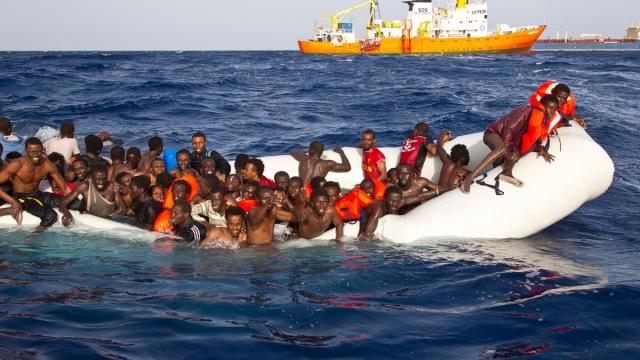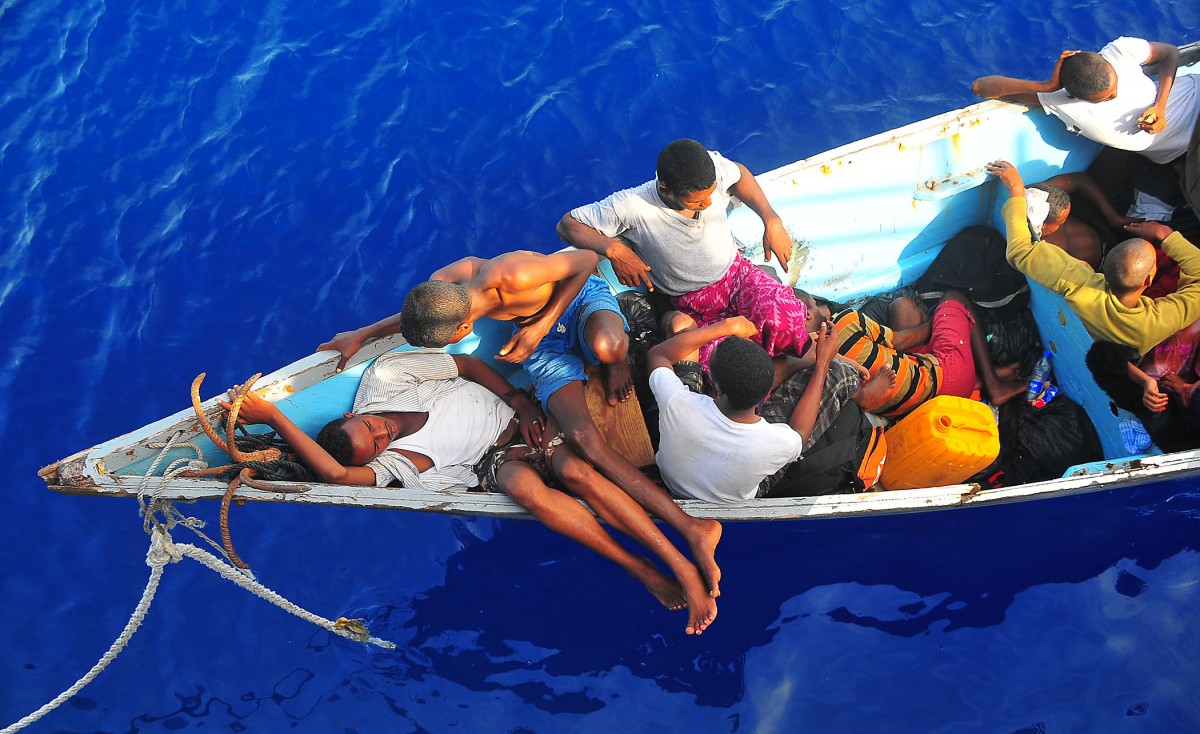
The world watched in 2015 as European countries struggled to find solutions to the migrant crisis happening in their backyard. At the time, the main focus was on refugees of Middle Eastern descent; conversations routinely disregarded the African migrants who also risked – and often lost – their lives on the journey. But according to the UN High Commissioner for Refugees, Somalis were among the top five nationalities migrating to Europe and made up more than 5 percent of the total refugee population. In 2016, more than 1 million people fled across the Mediterranean and survived the trip, while thousands of others died. And as we saw earlier this month with the tragic, forced drowning of at least 50 Somalis off the coast of Yemen, the risks remain as high as ever.
In the recent event off Yemen, smugglers actually pushed migrants off the boat into the water, forcing them to drown when they noticed an authority boat approaching. This wasn’t the only time Somali migrants were murdered at the hands of smugglers. Earlier this year, in March, it was reported that a boat carrying over 120 Somali refugees off the coast of Yemen received open fire from a military helicopter, and 42 people died on the scene.
Though these reports have been steadily increasing this year, no outrage from the public has been detected. Many Somalis are criticizing NGOs and local officials, demanding they do something about the tragic wave of events. But what is the migrant crisis in Somalia really like? Who exactly are these people, and why are they willing to risk everything for the security they believe awaits them in Europe?
In the Somali language, the migrant process is referred to as "Tahreeb." Tahreeb is an Arabic word that means trafficking, but specifically within Somali culture; Tahreeb is the process of leaving Somalia and being smuggled into Europe or the Middle East. It is a business that has become known to many young Somalis in the Horn. Somali youth, ranging from 14 to 21 years old, make up 5 percent of the migrants who arrived to Europe.
As a Somali-American myself, I was constantly told that the youth fleeing Somalia were always jobless college graduates. Nevertheless, research shows that most of the youth are still in school. Over 70 percent of the Somali population is under 30. Youth play a vital role in Somali society, but research shows that more than 60 percent of young people want to leave and find a better life in the West. The main reasons for this are the country's high unemployment rate, general instability, and the ongoing famine in the region.
Surprisingly, to get in contact with a smuggler and start the migrant journey isn’t as hard as one might expect. Dr. Nimo-Ilhan Ali, at University of London's School of African and Oriental Studies, conducted research on the migrant crisis in the Horn of Africa and wrote the book, "Going on Tahreeb." Dr. Nimo found in her research that many youths in Somaliland (a self-proclaimed independent state) and Puntland, a state within Somalia, know how to reach a smuggler due to the popularity of the practice. Smugglers recruit in schools and are known to be everywhere in the capital of Ethiopia, Addis Ababa.
The most common smuggling route for Somali is through Ethiopia, where migrants connect with a smuggler and start their journey. Recently, smugglers have made the process even easier by creating a “leave now-pay later” scheme. Youth don’t have to struggle to come up with money for the job, or tell their families that they made the decision to go on Tahreeb. They can just leave and pay later when they meet with the smugglers. During this meeting, however, smugglers reportedly often abuse the youth and send videos or call their families demanding pay. The stereotype that has formed indicates that most of the youth who are fleeing come from wealthy backgrounds, hence they are able to afford it.
The smugglers have been making smart decisions and are well aware of the Somali lifestyle. Somali culture is family orientated and clan-based. If you’re in need of help, your clan will do anything to make sure you're stable and well. This factor makes the smugglers' "leave now-pay later" alternative more successful. Here’s how it works: the youth who choose the deferred payment option usually don’t consult with their family about finances when they are about to start their migration journey. But once they leave, their family is contacted and told to pay or face the threat that their son/daughter will be abused or killed. Families will do anything to raise money to free their child. Some sell land and livestock to pay the sum. Others have the privilege of connecting with family in the West or their clan to pay the smugglers. But sadly, most families don’t enjoy either option.
Many people in the West criticize Somali families and the community for not doing enough to stop the refugee crisis. In the media, we only see what Western countries are doing to deal with the migrant crisis, but rarely hear about the Horn of Africa. In Somaliland, the government has formed a committee to address the critical issue. All across the Horn of Africa, classes are being taught to try and convince youth not to embark on the journey. Religious leaders rebuke the practice at mosques and local gatherings. Activists like the internationally recognized singer Aar Maanta have made it a priority to fight migration creatively. Maanta, who was inspired by his own cousin going on the deadly journey, has a made a song about Tahreeb and has also been visiting schools in Somali refugee camps to discuss the reality of the crisis.
Although the Somali community has been doing work to stop the practice, youth are sill fleeing and dying en route to Europe or the Middle East. Many of the youth blame unemployment as their primary cause for leaving. As part of the Somali diaspora and as someone who greatly cares about the issues affecting people back home, I often wonder what we, in America, can bring to the table? Diaspora plays a vital role in the subject. In fact, many Somali locals blame the migrant crisis on the diaspora, saying that many diaspora members come back to Somalia and take job opportunities in the public sector. African Report stated that one-third of the Somali parliament is now composed of diaspora members. The major question many are now asking: do Somali diaspora members returning to Somalia overall contribute to Somalia’s growth, or hurt it?
I had conversations with fellow diaspora members and local Somali youth to get their perspectives on the issue. Mahad Mohamed, now a student at Loughborough University in the UK, agrees that the diaspora might be taking away jobs from other Somalis in the public sector. But he argues that they’re doing more when it comes to the private sector.
“Diasporas have started opening restaurants, malls, setting up taxi companies, and so on. All of which need local workers,” Mahad said. “The whole economy is financed by the diaspora to a huge extent. Somalia's GDP is around $5 billion to $6 billion, with diaspora sending more than $1 billion in remittances.”
Most Somali diaspora members send money to family members back home, contributing greatly to the economy. But Somali activist Ahmed Ibrahim disagrees that this is really a help. “The diaspora community, instead of feeding families in Somalia, create a job for one person who can cover the family bills. As an alternative, let them invest the idea to not make money on their own but to employ their families in Somalia. Do not give them the fish but teach them how to catch the fish to survive," Ahmed said.
This echoes the recent ongoing argument happening among Somalis around the world: How can diaspora members help Somalia without bringing back the white man's burden ideology and, in this case as well, taking jobs?
For diaspora members like myself, and other foreigners who want to help the Somali youth combat the migrant crisis, Dr. Nimo-Ilhan’s book, "Going on Tahreeb," discusses solutions and ways to assist the migrant crisis. The first policy recommendation is to promote awareness campaigns, making it a priority to educate youth on the dangers and consequences of the journey. One of the key recommendations the doctor also makes is mentorship. Many diaspora members return home and flaunt their success abroad, which inspires more youth to go on the migrant journey so they can achieve the same success.
According to Dr. Nimo-Ilhan, diaspora members should instead have mentorship programs connecting local youth to diaspora members who may be able to help the youth better understand how they can earn success and reach their potential while remaining in the Horn, rather than trying to flee it. The author explains that, ultimately, it should be everyone's job to make the migrant issue a priority and help save thousands of young people who are planning to make this dangerous journey.
3 WAYS TO SHOW YOUR SUPPORT
- Log in to post comments












